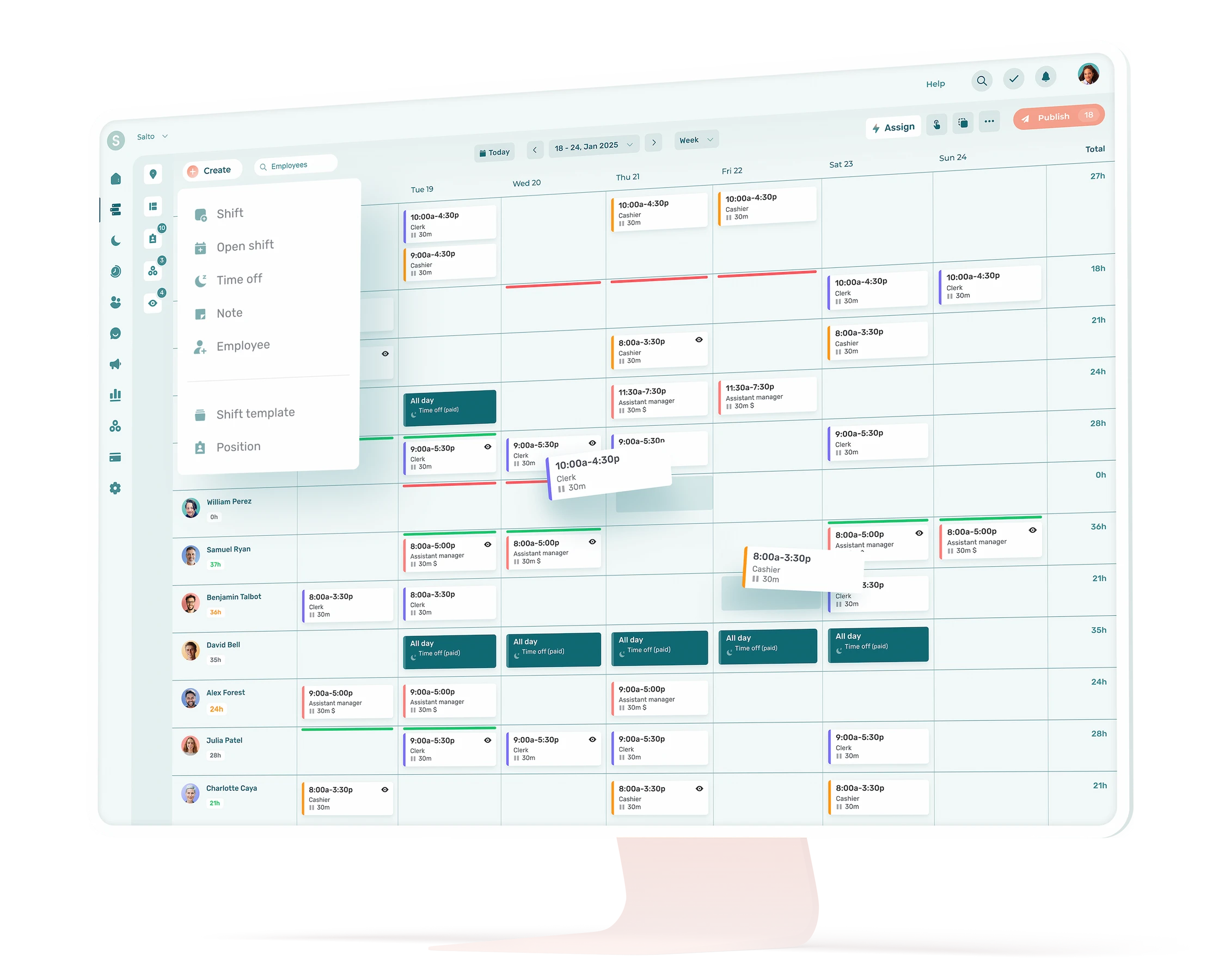Workplace presenteeism is as detrimental as absenteeism—yet its consequences for organizations are much less frequently discussed.
Presenteeism at work can lead to lower employee productivity, more mistakes, substantial revenue loss, greater employee dissatisfaction… and the list goes on.
Experts estimate that presenteeism costs approximately $150 billion per year in the United States alone. They point out that this is significantly higher than the cost of absenteeism.
Presenteeism can affect any organization, and this is why it is essential to understand it properly and to have tools to curb its impacts.
In this post, you’ll learn about the nature and types of presenteeism, its root causes, and how you can fight it.
What Exactly Is Presenteeism?
In concrete terms, employees who engage in presenteeism are physically present at work, but have mentally “checked out” or are physically ill, which prevents them from adequately performing their duties. Presenteeism is also often seen as a symptom of employee disengagement.
There are several types of presenteeism:
- Contemplative presenteeism: When an employee is present at work but does few or none of their assigned tasks. The employee feels unmotivated to do their job adequately.
- Strategic presenteeism: When an employee arrives very early and leaves very late without having done as much work as they could have, in order to suggest to their supervisor that they are dedicated to their job. The employee feels pressure to be present at work in order to display their loyalty or wants to accumulate more hours each week without increasing their workload.
- Sickness presenteeism: When an employee shows up to work in spite of being sick or is simply not willing to give their best. They feel pressure to be present at work so as not to fall behind on their tasks or disappoint colleagues or the boss.
What Are the Causes of Presenteeism?
Not all employees who engage in presenteeism have bad intentions.
For some, showing up to work in spite of a health issue is a way to prove their loyalty and dedication. Some may even fear that if they miss work for an extended period of time, they’ll miss out on opportunities or will lose their place to other employees.
Employees sometimes choose to practice presenteeism in order to put in as little effort as possible and still keep their jobs.
Here are some examples of the most common causes of workplace presenteeism:
- A lack of sick days
- A toxic work environment
- Stress
- Inadequate working conditions
- Work overload
- Lack of flexibility
- Lack of trust on the part of their immediate supervisor
- Pressure from colleagues
- Fragile health
- Reasons connected to their personal life
- Bad faith
Are Your Employees Candidates for Presenteeism?
Now that you understand what presenteeism is and what its causes are, you’ll want to know how you can spot it.
Here are some red flags of employees engaging in presenteeism at work:
- Changes in behavior: a good-natured employee becoming increasingly sullen, negative and unsmiling.
- Higher stress levels: an employee looking more stressed and tired, struggling to meet deadlines, or being constantly overwhelmed with their work requirements.
- More frequent mistakes: an employee regularly making mistakes even though this wasn’t the case before.
- Lack of focus: an employee often being spaced-out, asking you more questions than usual, or making you repeat yourself more often.
- Lower productivity: an employee no longer being able to meet the same goals as before, or no longer improving.
Of course, these examples are only indicators. If you really want to determine if an employee is practicing presenteeism, you also need to use your judgment to detect it in context. Note down your observations and record them in the employee’s file.
Feel free to discuss the situation with a human resources manager if necessary.
What Are the Best Strategies to Combat a Culture of Presenteeism at Your Company?
As a manager, your role is to make sure that you put the right conditions in place to motivate your employees to give the job their best and avoid presenteeism.
To do so, it’s essential to focus on your company’s environment and working conditions.
There are several things you can do to keep your employees motivated and engaged and avoid a culture of presenteeism. To keep things simple, I have put together the 3 best strategies for tackling the problem.
1. Making Your Employees’ Well-Being a Priority
The best and most important tip is to prioritize your employees’ well-being in your decision-making. This will not only help reduce the risk of presenteeism on your team, but deliver several other benefits, such as higher employee satisfaction, lower turnover, improved team loyalty, greater productivity and performance, etc.
Supporting your employees’ well-being will help you avoid having them show up to work in spite of being sick. This form of presenteeism is very detrimental to an organization as employees are more likely to burn out, require extended sick leave, or quit.
A Few Practices to Implement With Your Team
- Keep your employees’ workload reasonable
- Set an example for your employees and take sick days when you aren’t feeling well
- Give your employees more sick leave than the minimum required by law
- Build a vibrant and appealing employer brand by offering competitive working conditions and organizing fun team-building activities
2. Demonstrate Caring Leadership
Managers’ leadership makes a big difference in the motivation and engagement of their employees.
Strive to develop a bond of trust with your employees and demonstrate caring management practices.
Whether you’re a restaurant manager, a hotel manager or an executive at a seniors’ residence, make it a point to connect with your employees. Reach out to them on a more regular basis, whether by sharing a meal together or sending them satisfaction surveys using scheduling software.
A good leader will be able to fire up and inspire team members. Believe me, this can drastically impact the way your employees work. People are much less likely to give their best effort when they don’t trust their boss.
A Few Practices to Implement With Your Team
- Take the time to get to know your employees on a more personal level
- Deal with conflicts as they arise, rather than wait for the situation to escalate
- Regularly spell out your expectations with your employees so that they understand what is expected of them
- Don’t micromanage
- Listen to your employees
- Regularly survey your team members on their job satisfaction and use their feedback to introduce changes
- Thank your employees more often
3. Better Organize the Work
The way you organize the work within your team will directly impact your employees’ performance and motivation.
If you always share the schedule with your employees at the last minute, make it difficult to take time off, and pressure your employees to work harder and harder, chances are your employees will end up engaging in presenteeism.
It is so important to be organized and have clear HR processes in place. Make sure you create balanced work schedules, have enough staff to handle busy times, and enable your employees to enjoy a good work-life balance.
A Few Practices to Implement With Your Team
- Get scheduling software in order to make it simpler to manage your employees and provide them with a better work experience
- Don’t hesitate to take on more hires before your current team gets overwhelmed
- Hold regular one-on-ones with your employees
- Provide professional development opportunities to keep your employees from being unchallenged at work
- Put in place clear HR procedures to guide employee management
Now it’s up to you to take action!










